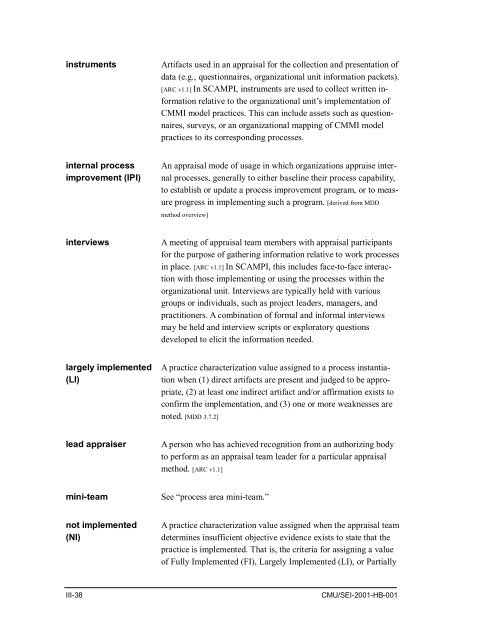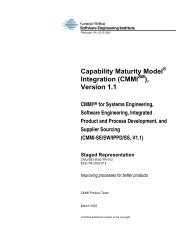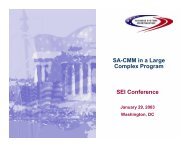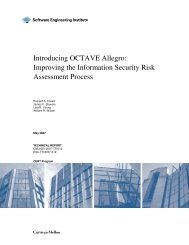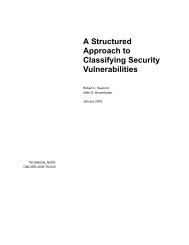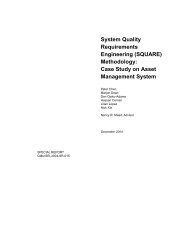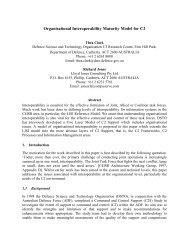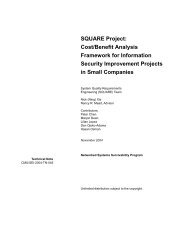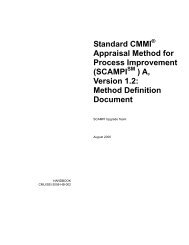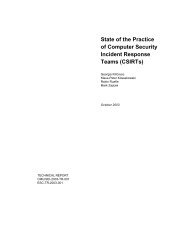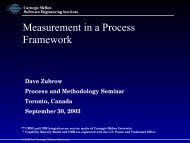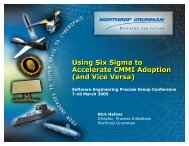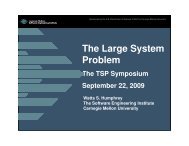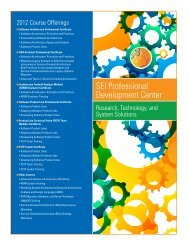Standard CMMI Appraisal Method for Process Improvement (SCAMPI)
Standard CMMI Appraisal Method for Process Improvement (SCAMPI)
Standard CMMI Appraisal Method for Process Improvement (SCAMPI)
Create successful ePaper yourself
Turn your PDF publications into a flip-book with our unique Google optimized e-Paper software.
instruments<br />
Artifacts used in an appraisal <strong>for</strong> the collection and presentation of<br />
data (e.g., questionnaires, organizational unit in<strong>for</strong>mation packets).<br />
[ARC v1.1] In <strong>SCAMPI</strong>, instruments are used to collect written in<strong>for</strong>mation<br />
relative to the organizational unit’s implementation of<br />
<strong>CMMI</strong> model practices. This can include assets such as questionnaires,<br />
surveys, or an organizational mapping of <strong>CMMI</strong> model<br />
practices to its corresponding processes.<br />
internal process<br />
improvement (IPI)<br />
An appraisal mode of usage in which organizations appraise internal<br />
processes, generally to either baseline their process capability,<br />
to establish or update a process improvement program, or to measure<br />
progress in implementing such a program. [derived from MDD<br />
method overview]<br />
interviews<br />
A meeting of appraisal team members with appraisal participants<br />
<strong>for</strong> the purpose of gathering in<strong>for</strong>mation relative to work processes<br />
in place. [ARC v1.1] In <strong>SCAMPI</strong>, this includes face-to-face interaction<br />
with those implementing or using the processes within the<br />
organizational unit. Interviews are typically held with various<br />
groups or individuals, such as project leaders, managers, and<br />
practitioners. A combination of <strong>for</strong>mal and in<strong>for</strong>mal interviews<br />
may be held and interview scripts or exploratory questions<br />
developed to elicit the in<strong>for</strong>mation needed.<br />
largely implemented<br />
(LI)<br />
A practice characterization value assigned to a process instantiation<br />
when (1) direct artifacts are present and judged to be appropriate,<br />
(2) at least one indirect artifact and/or affirmation exists to<br />
confirm the implementation, and (3) one or more weaknesses are<br />
noted. [MDD 3.7.2]<br />
lead appraiser<br />
A person who has achieved recognition from an authorizing body<br />
to per<strong>for</strong>m as an appraisal team leader <strong>for</strong> a particular appraisal<br />
method. [ARC v1.1]<br />
mini-team<br />
See “process area mini-team.”<br />
not implemented<br />
(NI)<br />
A practice characterization value assigned when the appraisal team<br />
determines insufficient objective evidence exists to state that the<br />
practice is implemented. That is, the criteria <strong>for</strong> assigning a value<br />
of Fully Implemented (FI), Largely Implemented (LI), or Partially<br />
III-38<br />
CMU/SEI-2001-HB-001


